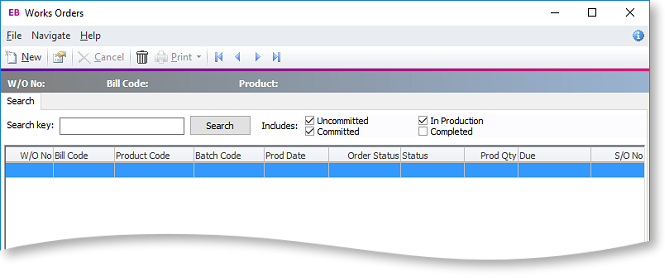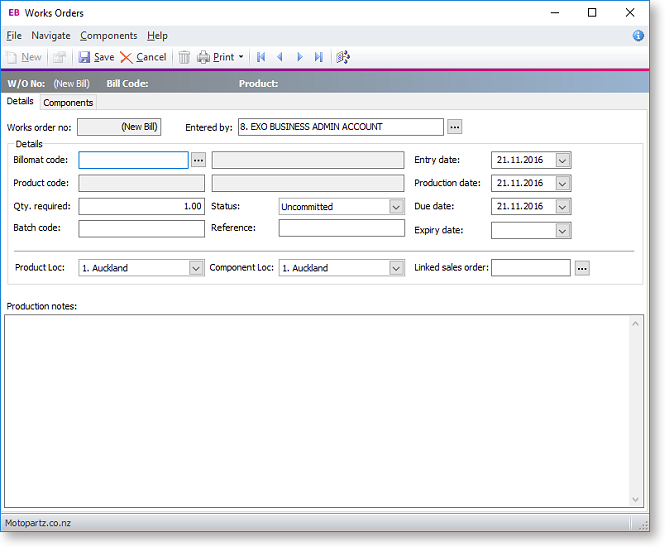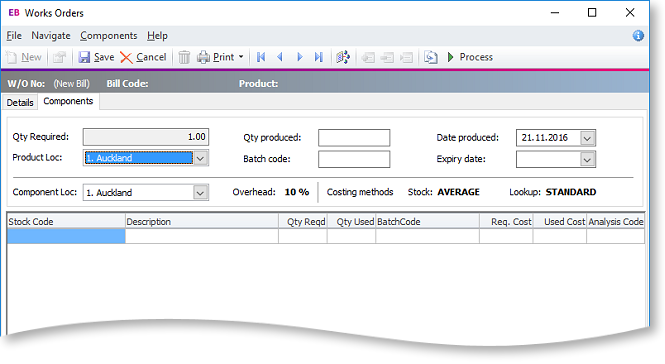Creating a Works Order
Transactions > Manufacturing > Works Order Entry
A Works Order is a more complex version of a build-type Bill of Materials.
To create a Works Order:
-
Select Works Order Entry from the Transactions > Manufacturing menu. The following window appears:

-
Click the New button. The following window is displayed:

-
Complete the fields on the Details tab.
Field
Description
Works order no
The number of the selected works order. This number is assigned when the Works Order is first saved.
Entered by
The name of the staff member entering the works order. Click the
 button to select the staff member’s
name.
button to select the staff member’s
name.Billomat code
The Bill of Materials code. Click the
 button to select a Bill of Materials. Only build-type Bills
of Materials are available, as these are the only BOMs that
undergo a manufacturing transformation.
button to select a Bill of Materials. Only build-type Bills
of Materials are available, as these are the only BOMs that
undergo a manufacturing transformation.Product code
The code of the Bill of Materials' output item.
Qty. required
The quantity to be produced.
Batch code
The production batch code. You can add this Works Order to an existing batch.
Status
The production status:
-
Uncommitted
-
Committed
-
In Production
-
Completed
Reference
An optional reference code. May be left blank.
Entry date
The start date for the Works Order.
Production date
The production date for the Works Order.
Due date
The date the Works Order is to be completed.
Expiry date
The date the Works Order expires.
Product Loc
The location to which the final product should be transferred.
Component Loc
The location that components are being supplied from.
Linked sales order
The number of the Sales Order that the works order is linked to. Click the
 button to select a Sales Order.
This field is optional.
button to select a Sales Order.
This field is optional.Production notes
Any notes that you may need to make in relation to this works order.
-
-
Click the Components tab.

-
Complete the fields at the top of the Components tab.
Field
Description
Qty Required
The total quantity to be produced.
Qty produced
The quantity to be produced in this operation.
Date produced
The date the works order is completed.
Product Loc
The location to which the final product should be transferred.
Batch code
The production batch code.
Expiry date
The date the Works Order expires.
Component Loc
The location that components are being supplied from.
-
Use the buttons on the toolbar to add or remove components:
Button
Function

Load all components from the Bill of Materials.

Add a component.

Remove a component.

Replace a component.
-
The following fields are displayed for each component:
Field
Description
Stock Code
The stock code of the item.
Description
The description for the item. Read only.
Qty Reqd
The quantity of the component required to fulfil the entire Works Order. Read only.
Qty Used
The quantity of the component to be consumed in this operation.
BatchCode
The production batch code.
Req. Cost
The total cost of the required number of the component. Read only.
Used Cost
The cost of the components consumed in this operation. Read only.
Analysis Codes
Any Analysis Codes you want to associate with the Works Order.
Clicking the
 button sets
the Qty Used value for all
components to the Qty Reqd
value.
button sets
the Qty Used value for all
components to the Qty Reqd
value.You can double-click on an item to drill down to the Stock screen for that item.
-
Click Save. You are given the opportunity to print the Works Order.
Once the order is saved, a Documents tab becomes available, where you can attach any documentation that relates to the order.
Note: The Works Order will appear on the Works Order tab of any Stock item that is involved in it, either as a component or as an output item.
